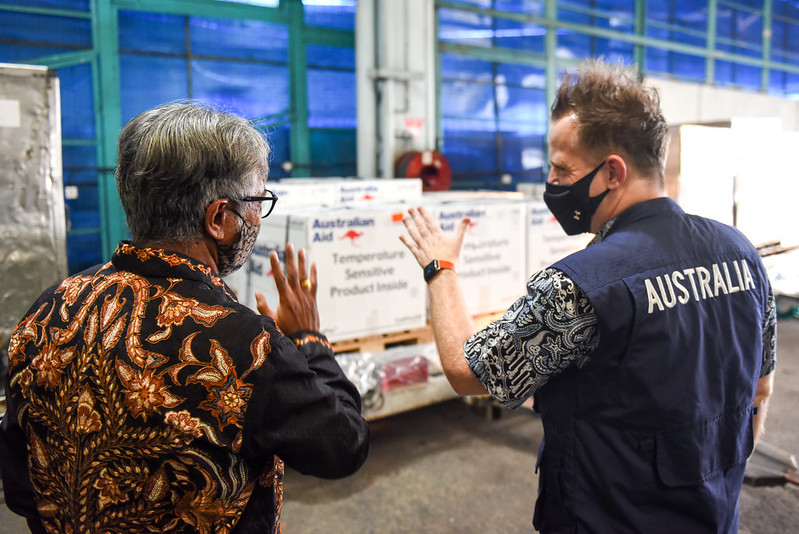COVID-19 Vaccines delivered
8,395,000 doses
Vaccine doses committed from Australia’s supply
Providing Technical Expertise
Strengthening systems to ensure vaccine safety, including implementation of a pharmacovigilance monitoring system.
Supporting planning and delivery of a safe, effective and equitable COVID-19 vaccination program.
Supporting National Vaccine Rollout
Vaccine readiness and microplanning.
Vaccine registration data and monitoring.
Supply chain preparedness and support, including remote temperature monitoring for vaccine storage locations.
Establishment of vaccination centres in remote areas.
Updating vaccine surveillance.
Support for increased capacity for genomic sequencing.
Guidance on prioritisation of vulnerable groups.
Risk communication and community engagement.
Training and capacity building for vaccine delivery.

Our Impact So Far
• Through the World Health Organization (WHO) and UNICEF, Australia has provided technical support to Indonesia’s Ministry of Health (MoH) on vaccine introduction and system preparedness, as well as vaccine readiness assessments at both national and subnational levels. UNICEF has also played a critical role in vaccination microplanning, financing, quality and advice in strengthening cold chain capacity, including for the safe introduction of mRNA vaccines.
• Through WHO, we funded rapid technical assessments in 11 villages to assist targeting vaccines for priority groups under Bali's reopening agenda and supported the increase of vaccination teams for vaccine roll-out.
• In consultation with the MoH, partners have undertaken critical risk communication and social inclusion work, including to develop media products to combat vaccine misinformation and hesitancy across target provinces. The Australia-Indonesia Health Security Partnership (AIHSP) also commissioned a vaccine acceptance survey focused on cross cutting issues in COVID-19, including gender, disability and social inclusion, with a view to inform campaign strategy.
• Partners contributed to better data management to support the vaccine response. This included through the development of a publicly accessible vaccine monitoring dashboard that details vaccine distribution and coverage at the national, provincial and district levels.
• Through UNICEF, we supported the MoH to undertake an ‘effective vaccine management’ assessment of private sector hubs to improve vaccine logistics.
• AIHSP paired with CSIRO experts to assist MoH to develop a prototype platform for advanced Whole Genome Sequencing analysis. This was complemented by WHO support to the MoH to develop and implement a national strategy for SARS-CoV-2 genomic surveillance which assisted Indonesia to increase its reporting to GISAID.
• Australia’s grant funding under the World Bank’s Indonesia Emergency Response to COVID-19 Additional Financing (ER-AF) operation was earmarked towards achievement of three disbursement-linked indicators: vaccinator capacity building and training; implementation and functioning of a national pharmacovigilance system; and installation of remote temperature monitoring in vaccine storage locations. All three indicators have been either partially or fully achieved.
• Through UNICEF, WHO and AIHSP, key deployments have enabled the provision of technical support across various activities at the national and provincial levels. Technical support included related to vaccine procurement and policy.
Read more:



